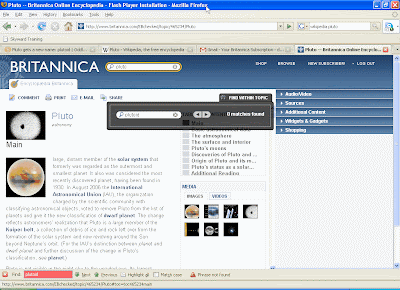Social Capital and EduBloggerCon
Two days later, here are some of my thoughts regarding this year's version of EduBloggerCon.
Short, Shallow Version Beginning with IMHO:
- Ewan hopes for an EduBloggerCon that includes far too many /plug your ears, Bud/ sages on the stages /end ear plugging/. Besides, it's easy to gripe. Why not help with the planning or offer solutions?
- Mark has done a fantastic job with proposing possible solutions. His list of well-thought-out possibilities (under the heading Looking Ahead) should be considered before tackling future events.
- Jeff's concerns are valid and should equally be addressed as we move ahead.
- Will and company lead many of the impressionable whether they like it or not. Likewise, EduBoggerCon will only be what we make it. "We", in this case, refers to those that care enough to stick through the rough patches. Bugging out early does nothing for providing solutions. Ryan's advice might apply here.
- Vinnie's third factor was dead on. This was the EduBloggerCon of out-streaming, out-tweeting, and out opinion-ating. Again, you can choose to either report the conversation or actually participate in it. It's very difficult to do both well.
To begin with, social capital exists in every society. According to Shirky (2008):
When your neighbor walks your dog while you are ill, or the guy behind the counter trusts you to pay him next time, social capital is at work… Societies characterized by a high store of social capital overall do better than societies with low social capital on a similarly wide range of measurements, from crime rate to the costs of doing business to economic growth. (p. 192)While there exist a number of definitions for the term social capital, I see the concept as a descriptor of how well members of a community care for each other.
In our small community - think 200 EduBloggerCon-ers versus 18,000 NECC-ers - social capital exists but unfortunately ours appears to a society characterized by a pathetically paltry store. Events transpiring at EduBloggerCon clearly demonstrate this.
Sad, to say the least, so first the positive then the negative.
On the bright side, our community does have at least some traces of social capital. When Paul Wood, for example, kindly volunteered to help Vicki Davis by timing smack-downers during her session – social capital was at work. When six or seven people stayed after EduBloggerCon to help Steve Hargadon set up computers for the Open Source lab – social capital was at work. That’s the good news.
The bad news, at least for our growing community, is that other events transpiring at EduBloggerCon indicate that we’ve got more issues - as a community - than many would like to admit. Now I’m not talking about camera crews, I’m not talking about boom microphones, and I’m not talking about Pearson. Rather, I’m talking about support, giving when it might not improve your Technorati rating, and I’m even talking about what can easily be perceived as cocktail parties. Yes, I said it: Cocktail parties.
What I’m really talking about is this:

Without question, the "session" pictured above was an engaging, educationally rich, likely transforming experience for those precious few involved. It was unplanned, spontaneous, and informal. Additionally, it was likely exhilarating, enlightening, and oh so Edupunk.
Did we not all come to EduBloggerCon – often at our own expense – with hopes of engaging in an experience just like this?
Nevertheless, the scanty fortunate pictured above represent less than 1% of the people that actually attended EduBloggerCon. Moreover, as others gradually attempted to join in on this cocktail party of learning, when the party became too large, those that were truly invited quickly dispersed – with few of the elect deciding to return to the larger fold.
Aren’t we all here for the learning? Aren’t we all here for the rush? Nevertheless, because our community is growing – and at an exponential rate – the ability to provide such experiences for every interested individual becomes increasingly difficult. Notwithstanding, as problematic at this struggle may be, I think it would be in every educator’s best interest for us to identify the best possible ways to provide this kind of engaging, transforming, and edupunk-rich learning environment.
In my opinion, the best part of EduBloggerCon was when we all gathered at the end of the day to discuss what went well and what, frankly, didn’t. It was there that we were able to better come to terms with both how we felt about Pearson’s intrusions and how we hoped to approach our fold’s growing numbers. And while we could have benefited from the insight of those that had so hastily dispersed, I think it was clear in the end who was dedicated to helping our community grow – in spite of the growing pains we might be experiencing - and with hopes of including everyone interested.
As our grassroots community continues to grow, here’s to the hope that we might all stick together in this effort to provide everyone with the kind of learning experiences we remember having when the grass was much shorter.
Image Source: Flickr user derrallg
Technorati Tags: ebc08 edubloggercon08 necc08 shirky elite blogosphere






























